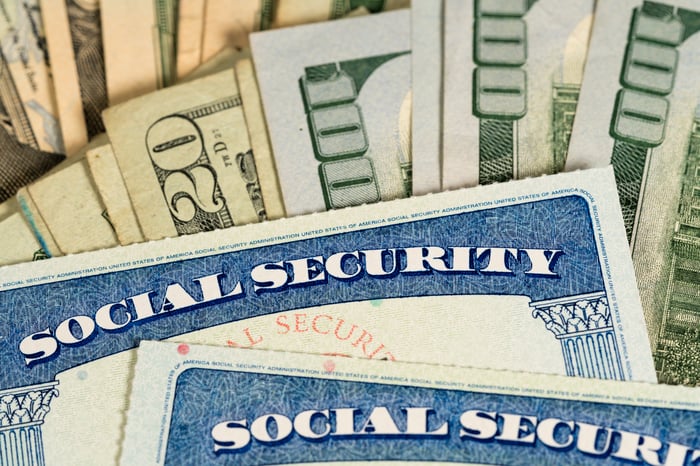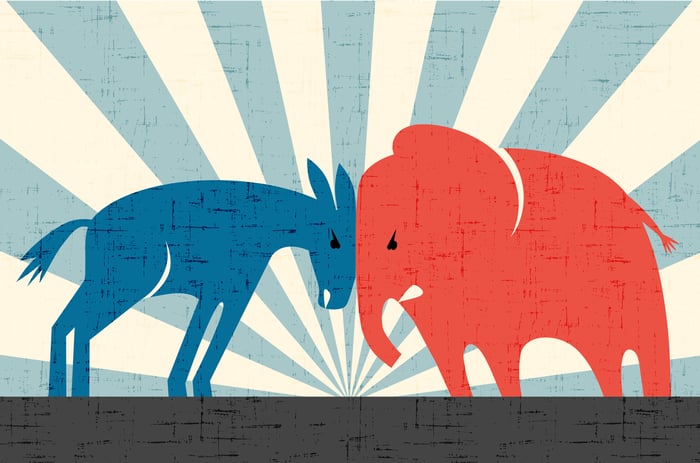Without question, Social Security is this country's most important social program. It can rightly be called a financial rock for millions of elderly Americans, with the benefits provided accounting for more than half of all monthly income for 62% of retired workers and the program single-handedly keeping 15.3 million of those aged beneficiaries above the federal poverty line.
But it's also a heavily criticized program for the way it collects revenue.

Image source: Getty Images.
Social Security's primary sources of funding, explained
Last year, Social Security generated $996.6 billion in income from its three sources of funding:
- $873.6 billion was collected from the 12.4% payroll tax on earned income up to $127,200 (in 2017).
- $85.1 billion was generated as interest income from the nearly $2.9 trillion currently held in Trust's asset reserves.
- $37.9 billion was derived from the taxation of Social Security benefits for those beneficiaries earning above select thresholds.
As you can see, the payroll tax is by far Social Security's workhorse. The sheer facts that the payroll tax exists and that virtually no lawmakers in Congress want to change Social Security's primary means of being funded ensure that the program can never go bankrupt. Even if Social Security's almost $2.9 trillion in excess cash disappears by 2034, as is projected by the latest annual Trustees report, the program will have plenty of annual revenue to continue making payouts to eligible beneficiaries.
The issue with Social Security is that ongoing demographic changes have made the existing payout schedule unsustainable. By 2034, after an estimated 16 years of net cash outflows (i.e., the program expending more than it brings in each year), its asset reserves will be gone. Should this happen, an across-the-board cut to benefits of 21% may be needed to sustain benefit payouts through the year 2092.

Image source: Getty Images.
Here's why Social Security's payroll tax appears flawed
Front and center to take the blame for this forecast is Social Security's payroll tax. You see, the payroll tax is set to cap in 2019 at $132,900. In other words, all earned income is taxable between $0.01 and $132,900, but anything beyond this amount is exempted. More than 9 out of 10 workers earn less than $132,900 in a given year, meaning a vast majority of Americans are paying into Social Security with every dollar they earn. Meanwhile, the wealthy who earn more than this amount will see some -- or most -- of their income exempted from Social Security's payroll tax.
To be clear, this maximum earnings tax cap is updated annually. It rises in step with the National Average Wage Index. Between 2016 and 2017, the NAWI rose from $48,642.15 to $50,321.89, an increase of 3.45%, or 3.5% when rounded. Thus, the payroll tax cap increases from $128,400 this year to $132,900 in 2019 (a jump of 3.5%). But even with the wealthy on the hook for $279 or $558 more in payroll tax next year, depending on whether they're employed by someone else or self-employed, a lot of money is still escaping taxation.
For example, the top 1% in America are earning $421,926 a year in 2018. This works out to about $1,155.96 in daily income in a 365-day year. By the end of the 115th day, which is April 25th, the top 1% will have hit $132,900 in yearly earnings, thereby exempting the remainder of their earnings the rest of the year from Social Security's payroll tax.

Image source: Getty Images.
The effect is even more pronounced with the ultra-rich. Basketball star LeBron James, who took home a $31.2 million salary in 2017 to go along with $55 million in product endorsements (that's $86.2 million for you math-phobes), earned $236,164 per day last year. With the payroll tax cap set at $127,200 in 2017, James was done paying into the system just before 1 p.m. on New Year's Day.
According to the Social Security Administration, the amount of earnings being exempted from taxation (i.e., surpassing the tax cap) has grown from $300 billion in 1983 to an estimated $1.2 trillion by 2016. With earnings for the wealthy growing at a much faster pace than for the average working American, this exemption amount is only expected to climb.
Why aren't we taxing the rich more?
Democrats on Capitol Hill have strongly favored raising or completely eliminating the earnings cap on the payroll tax -- and it's an idea that has strong support from the public. Completely removing the cap and exposing all earned income to the payroll tax would be expected to generate enough added income that the current payout schedule would be sustainable through 2092. Plus, increasing the payroll tax cap would only impact a small percentage of workers (fewer than 1 in 10).
So the question that's probably popped into your mind is this: Why aren't we taxing the rich more?
The first reason is because the Social Security Administration also sets a maximum monthly payout cap on benefits at full retirement age (i.e., the age at which you become eligible for your full benefit, based on your birth year). In 2018, regardless of whether you averaged $400,000 in annual income throughout your life or $86 million, you could do no better than a monthly benefit check of $2,788. Because this monthly payout cap exists, the amount that's subject to taxation exists, too.

Image source: Getty Images.
The second reason is that in order to amend Social Security (i.e., raise or remove the cap), we'd need bipartisan support. And when it comes to Social Security, Democrats and Republicans agree on virtually nothing. Each party has a core solution to fix the program that works. Unfortunately, because their solutions work, neither party believes in the need to compromise and find common ground with their opposition. Short of having a supermajority of 60 seats in the Senate, Social Security reform is off the table.
Last -- and here's a healthy dose of honesty -- it could impact campaign financing. Without beating around the bush, the wealthy are the biggest contributors to the campaigns of those elected in Washington. If the payroll tax suddenly were applied to all of their earned income, these wealthy individuals probably wouldn't be too happy. They might even scale back or halt contributions to certain campaigns, which could worry lawmakers.
Clearly something needs to be done about Social Security's payroll tax, but it's unlikely to merit any attention for a long time to come.




